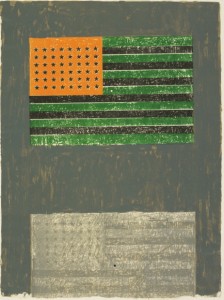
Johns, Jasper (b. 1930) © VAGA, NY
Flags. 1968. Lithograph, printed in color, irreg composition: 34 5/8 x 25 7/8″; irreg sheet: 34 5/8 x 25 7/8″. Gift of the Celeste and Armand Bartos Foundation. (291.1968)
Location: The Museum of Modern Art, New York, NY, U.S.A.
Photo Credit: Digital Image © The Museum of Modern Art/Licensed by SCALA/Art Resource, NY (ART193346)
Many commentators have taken Barack Obama to be proclaiming a new set of civic virtues or even a new civil religion to guide Americans into an uncertain future. Yet in his Inaugural Address, Obama himself argued otherwise: “Our challenges may be new, the instruments with which we meet them may be new, but those values upon which our success depends, honesty and hard work, courage and fair play, tolerance and curiosity, loyalty and patriotism—these things are old.” So we may well ask—how old are these values? In what traditions are they rooted? Are they religious or secular? For the answers to these questions will be reflected in Americans’ willingness—or unwillingness—to unite around them.
Obama terms these “values.” But they are for the most part more specifically virtues, that is, settled traits of character that dispose a person to act in excellent ways. And Obama does elsewhere speak of these as virtues, most revealingly, I think, in his early memoir, Dreams from My Father, written before he aspired to political office. During his college years, his growing consciousness of racism tempted him to wallow in hatred and despair, to cling to an identity of alienation from anything tainted by white culture, including its hypocritical moralism, its “needlepoint virtues.” Yet he eventually came to recognize these virtues as themselves unsoiled, to see that the fact that these were the values of his white Midwestern grandparents did not mean he had to reject them in order to be authentically black. He was able to see that these virtues were exemplified not just by whites but by black people he respected, who had held tenaciously to them despite the degradations they had faced. These virtues were old enough to grace nineteenth-century needlepoint samplers, but they were not simply white, not simply Midwestern, and not simply American, either; it was to his Kenyan father that Barack’s mother appealed as a model of diligence, honesty, and integrity. Obama’s list may be carefully crafted to appeal to both Democrats and Republicans. But while it is an exercise in political rhetoric, it is not solely that; it is genuinely rooted in Obama’s own moral experience.
Western conceptions of the virtues are older, of course, than Obama’s grandparents, going back to the ancient Greeks. Obama’s list of virtues comes in pairs, and the pairings are mutually illuminating. I will, though, examine them not in the order in which they are listed in the address, but rather according to the depth of their roots, beginning with those anchored most firmly in the ancient classical and, later, the Christian traditions of the West. What emerges when we take this angle of approach, I will argue, is not simple continuity. Neither do we uncover a sharply defined contrast between classical and Christian, or ancient and modern, virtues. Rather, what comes into focus is a continuously unfolding understanding of the virtues, driven on the one hand by socio-historical changes and on the other by efforts to resolve internal tensions in how the virtues are conceived, both singly and in relation to one another.
Plato and Aristotle recognized four cardinal or hinge virtues: prudence, justice, temperance, and courage. Only one of these, courage, makes it onto Obama’s list. But what does he mean by courage? For Aristotle, performing deeds of prowess on the battlefield was the paradigm of courage. For Thomas Aquinas, in contrast, martyrdom served as the paradigm, and the heart of courage was endurance for the sake of the good rather than direct attack on evil. Obama here issues neither a summons to military valor nor to martyrdom. Like Aquinas, though, he understands courage centrally as a matter of the capacity to persevere in the pursuit of the good, in this case in the difficult but worthy task he sees before us as a nation.
Honesty, loyalty, and patriotism also have a claim to a heritage reaching back to classical antiquity. Our honesty is not the Latin honestas, which is nearly synonymous with virtue, but rather truthfulness. Truthfulness remains one of the nameless virtues for Aristotle, but he does insist that falsehood is to be avoided for its own sake. Aquinas, while noting that without truthfulness, trust and community ultimately become impossible, also insists that truthfulness is owed to one another in justice. So both agree that the good of honesty is not simply reducible to the good consequences that arise from it or to the bad consequences avoided by it. Kant raised truthfulness to an exceptionless absolute, arguing that if a murderer comes to my door in hot pursuit of my friend, I must in answer to the murderer’s question truthfully reveal my friend’s whereabouts. But there is no hint that Obama follows Kant down this specious path; practical wisdom must determine when the virtue of truthfulness becomes the vice of scrupulosity.
Loyalty is closely akin to fidelity or faithfulness; one who is loyal does not abandon commitments when something new and attractive comes along. Loyal fans support the home team even in the face of a long losing streak; the loyal son does not expose his father’s faults to ridicule. Loyalty is a virtue that is important for sustaining friendships, families, and communities of all kinds. But persistent attachment, which turns a blind eye to injustice or falsehood, is not a virtue. Cardinal Jacopo Sadoleto, seeking at the time of the Reformation to regain the city of Geneva for the Catholic Church, argued that God would reward faithful Catholics for their loyalty to the faith of their ancestors, even if some errors and abuses had entered into the Church. John Calvin retorted that adherence to a corrupt Church was not a virtue but a vice. They agreed that loyalty was a virtue, but the challenge of defining its proper objects and limits remained.
The fact that Obama pairs patriotism with loyalty gives us a strong hint as to how he intends the former. He means here, I think, not the nineteenth-century concept of nationalism, promotion of the power and influence of one’s nation-state, but something rooted in the classical conception of pietas. Unlike piety, which in modern English is limited to religious devotion and often carries a saccharine tinge, pietas was for classical Greece and Rome the virtue of dutiful respect for parents, the gods, and other legitimate authorities. Christians insisted that God was not simply another object of pietas, but the sole proper object of worship. Patriotism then emerges as a subdivision of this virtue directed toward one’s homeland (one’s patria, literally fatherland), people, culture, and traditions. With the rise of nationalism, the term became increasingly limited to the political realm and the absolute claims of the nation-state, but contemporary political thought has worked to recover and develop an older understanding of patriotism. Love of country can motivate critique of the government and its policies. Like loyalty, patriotism is not a virtue if it is blind.
The remaining four virtues are considerably younger. The ideal of fair play is a legacy of the nineteenth-century leisured classes, who celebrated the joys of playful competition. Strict adherence to the rules and an emphasis on process rather than outcome enabled both winners and losers to enjoy the game. But fair play no longer conveys anything elitist to most Americans today. Fair play is a gymnasium rather than a needlepoint virtue. It evokes the screech of rubber soles on polished wood floors and its cousin, good sportsmanship. But fair play includes fairness as a constituent element, and fairness is closely connected with justice. So why fair play rather than justice? Justice has an impeccable pedigree as one of the four cardinal virtues, not to mention as a central theme of the Hebrew prophets. It is not hard to understand why the other cardinal virtues, temperance and prudence (or practical wisdom), would be missing. They sound both old-fashioned and puritanical. Were Obama to summon Americans to temperance, especially now, that would too clearly send the message that now is a time of belt-tightening—which in turn might cause the temperature of an already-deep frozen economy to plummet.
But why not justice? Because calls for justice are too closely associated with the political left? Because Obama does not want to be too closely identified with the civil rights movement, too easily seen as a President for black Americans rather than for all Americans? Perhaps. But also, I think, because of his own experience of coming to terms with his blackness, his own experience that a preoccupation with identifying the injustices perpetrated by others can too easily become an excuse for evading one’s own moral responsibilities. So he chooses fair play, with its fresh-paint, clean American feel, instead of justice. Obama’s commitment to social justice is, I think, unquestionable. However, his own touchstone virtue is not justice but responsibility, named in the Inaugural Address just a few sentences after the list of eight virtues: “What is required of us now is a new era of responsibility—a recognition, on the part of every American, that we have duties to ourselves, our nation, and the world, duties that we do not grudgingly accept but rather seize gladly, firm in the knowledge that there is nothing so satisfying to the spirit, so defining of our character, than giving our all to a difficult task.”
This brings us to hard work, which, like dying slowly of cancer, was considered ignoble by the ancient Greeks. Christians, too, given a savior who called his disciples away from respectable trades into an itinerant lifestyle, have traditionally had ambivalent attitudes toward work. In the Middle Ages there were intense debates over the moral status of work, ignited by the rise of the mendicant religious orders, whose members took vows of poverty, refused to own property, and depended on charity for sustenance. Thomas Aquinas defended the legitimacy of the mendicant orders by arguing that manual labor is not a duty held by each and every individual. Yet this is not to say that he rejected the virtue of industriousness. The mendicant orders were not mere leeches on medieval society; they worked hard to provide for the spiritual needs of the community, even as they depended on the manual labor of others for their food and clothing. Hard work really came into its own, though, only in the early modern period. It was central to the Protestant Ethic, which sociologist Max Weber identified as the source and spirit of capitalism. Rather than seeking to separate themselves from an impure world, Calvinists sought to transform the world in accordance with God’s will. The world had been entrusted to the dominion of Adam and Eve, and their responsibilities could be carried out in a fallen world only with plenty of elbow grease. What began as an expression of religious duty would acquire a dynamic of its own, as divine approval and the purported worldly rewards of industriousness became intertwined. We see this reflected in Benjamin Franklin’s homespun wisdom, “Early to bed and early to rise, makes a man healthy, wealthy, and wise.” Industry, not surprisingly, was one of Franklin’s thirteen virtues—although we might point out that it is not really a virtue if adherence to it is contingent on whether it yields financial prosperity.
Since curiosity killed the cat, it clearly was not always considered a virtue. Adam and Eve were banished from the Garden of Evil for eating from the Tree of the Knowledge of Good and Evil, which the serpent promised would make them like God. But the pursuit of knowledge has hardly been condemned outright by the Christian tradition. In Of True Religion, St. Augustine wrote that “in studying creatures, we must not be moved by empty and perishable curiosity; but we should ever mount towards immortal and abiding things.” Curiosity is a vice when the pursuit of knowledge is separated from the search for God, for what is of abiding value. Augustine’s critique is of “mere” curiosity, of value-neutral inquiry. Curiosity begins to emerge as a positive virtue in the Renaissance, with a new optimism about the human capacity to study the world and thereby mount toward immortal and abiding things, to an understanding of the intentions of the divine Creator. The legend of Faust, who sells his soul to the Devil for the sake of dark knowledge and power, testifies to a lasting cultural ambivalence about curiosity, an uncertainty over whether it is at heart an expression of a desire to rival God, or of a desire to know and worship God. Ongoing debates about the proper limits of scientific research are often cast in terms of these alternatives. But in the context of the early nineteenth-century rise of the ideal of liberal education, curiosity no longer signals hubris or lust for divine power, but a relaxed openness to the manifold variety of the world, a willingness to engage with, and learn from, otherness. This, I think, is Obama’s curiosity, closely linked to the tolerance with which it is paired—the curiosity of someone who discovered himself as an American through a boyhood in the salad bowl of Hawaii, in Indonesia, and in visiting Kenya.
We come finally to tolerance, a modern liberal virtue if there ever was one. Why should one refrain from interfering with beliefs and practices that one considers wrong, rather than seeking to correct them? Augustine infamously advocated that the Donatists be compelled to rejoin the ranks of the Catholic Church. As long as schism was understood as the breaking of an oath of fidelity, and heresy as willful refusal of the truth, neither toleration as an institutional policy nor tolerance as an individual disposition had much of a chance. Gradually, though, through the hard-earned experience of the fragmentation of European Christendom following the Reformation, religious dissent came to be understood as inculpable rather than culpable error. This in turn allowed other traditional Christian teachings, which had long been eclipsed, to come to the foreground in support of toleration—that faith cannot be engendered by compulsion, that it is wrong to go against one’s conscience, that Christians are called to forbearance and charity. In the nineteenth and twentieth centuries, the range of tolerance broadened to include not just religion but other sorts of beliefs and practices as well. The commitment to tolerance need not be associated with skepticism, relativism, or indifference, although it is sometimes attacked as if this were the case. It stems most centrally from the conviction that only a free acceptance of the truth is a genuine acceptance of the truth.
Obama’s “old things,” then, do have deep roots in both the classical and Christian traditions. At the same time, they have a contemporary, American feel. They do not represent a simple retrieval either of the classical cardinal virtues or of the supernatural Christian virtues of faith, hope, and love. Rather, they represent the ways in which traditional Western understandings of the virtues have evolved over time, working out internal tensions and engaging with changing social realities—religious diversity, the rise of modern science, the emergence of the middle class. Important debates continue over the proper definition and limits of these virtues, but these debates have not prevented these virtues from earning broad acceptance. Religious and secular Americans can legitimately claim common ownership of them, though they will not offer all of the same reasons for espousing them. I have focused my reflections on classical and Christian roots, but I, at least, am hopeful that others can trace analogous lines of development within their own traditions that give them reason to recognize these or analogous virtues as well. For these are, finally, neither simply old and venerable nor new and shiny virtues—these are living virtues.
[See David Kyuman Kim’s introduction to “These things are old,” a conversation about Obama, civic virtues and the common good at The Immanent Frame]













